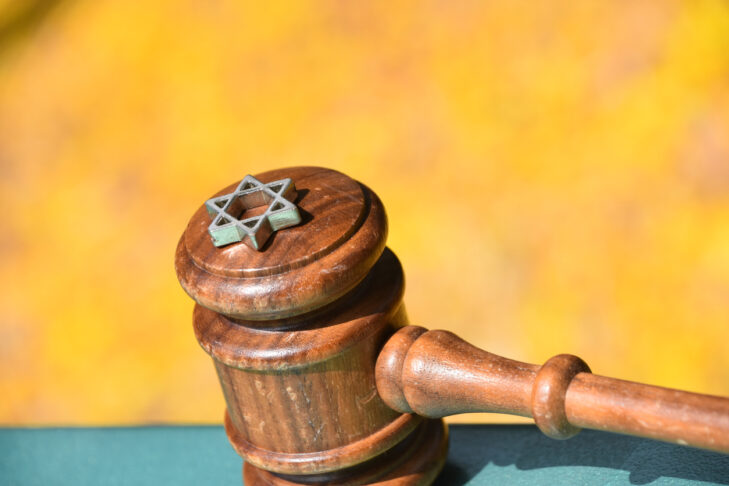The Supreme Court has overturned Roe v. Wade, ushering in a new era in which states will be free to regulate and strictly restrict access to abortion.
Many have done so already, enacting near-bans on the procedure, some with no exceptions for incest or rape.
Jews’ views on abortion largely depend on how observant they are and their denominational affiliation (Orthodox, Reform, Conservative, Reconstructionist, etc.).
But there is widespread agreement among scholars and rabbinical authorities that a complete prohibition on abortion is inconsistent with Jewish law and tradition. Under Jewish law, an abortion to save the life of the mother is permitted.
Related
Joffe, a legal scholar and expert on women’s equality and religion, talked about Jewish beliefs on abortion and potential legal challenges to anti-abortion statutes.
The views expressed here are Joffe’s and not necessarily those of Brandeis University.
What does the Hebrew Bible say about abortion?
The Bible makes clear that a fetus does not have the status of a human life. Exodus 21:22-25 says that if a man accidentally hits a woman and she dies, the offender must be put to death—”the penalty shall be life for life.” But it also says that if the man accidentally hits the woman and she miscarries, he must pay a fine to her husband. If the fetus were seen as a full human being, the punishment would again be execution, not financial compensation.
Does Jewish law permit abortion?
The Talmud, a compendium of rabbinical commentaries and laws written during the first millennium C.E., characterizes a fetus as “mere water” and doesn’t prohibit abortion before 40 days gestation. After this point, abortion is generally prohibited but exemptions are permitted to preserve the mother’s health or life.
If a woman is at risk of death while giving birth, the fetus can and should be destroyed to save her because her life outweighs its potential life. It is considered a mitzvah, a commandment, to save the life of a mother when she is at risk of life-threatening complications, such as an ectopic pregnancy or an incomplete spontaneous miscarriage. There are different rationales for this. The medieval French rabbi Rashi says it is permissible to terminate a pregnancy because the fetus is not yet a human life. Maimonides (also known as the Rambam), another major medieval Jewish thinker, takes a different approach. He says a fetus after 40 days gestation is a human life, but if its birth threatens the mother’s life, it is a “pursuer” (rodef in Hebrew), a human who is trying to kill another human. You can and should terminate the pregnancy if the fetus threatens the life of the mother.
But what about when the fetus isn’t a threat to the mother’s life?
Jewish denominations take different views on this. As currently construed, Orthodox conceptions of Jewish law do not support a woman’s right to choose an abortion for reasons of her own. But over time, the definition of when pregnancy jeopardizes the mother’s life has been expanded to include severe pain and suffering, including to her mental health.
The classic discussion in the modern era has been what to do about Tay-Sachs, a genetic disease that afflicts Ashkenazi Jews and causes those born with it to live brief and painful lives.
Orthodox rabbinical opinion on this is divided:
- Moshe Feinstein, the leading American Orthodox legal mind of the 20th century, forbade such abortions, even though he acknowledged “there is very great suffering involved.”
- Eliezer Waldenberg, a leading Israeli expert on Jewish law, took a different position, finding that abortion for Tay-Sachs and other conditions that caused great physical or mental suffering to the mother should be permitted because the Talmud required the alleviation of pain and suffering.
There is also not necessarily an exception for pregnancies that result from rape or incest, although a woman may be able to find a rabbi who will approve an abortion because of her mental suffering.
This is as far as traditional Orthodox halacha (Jewish law) goes, but it may be shifting. Leaders of the Open Orthodoxy movement, which seeks to liberalize Orthodox Judaism, recently wrote that they respect pregnant people’s rights to make up their own minds about how to proceed.
The Conservative movement is more lenient, permitting abortion if there’s a severe physical or psychological threat to the mother or the health of the fetus is severely compromised.
In 1983, the Conservative movement’s rabbinical authorities said abortion was allowed only “if a continuation of pregnancy might cause the mother severe physical or psychological harm, or when the fetus is judged by competent medical opinion as severely defective.”
Last year, the movement’s Committee on Jewish Law and Standards released a statement saying: “Neither viability nor a woman’s right to choose is the basis of Jewish law on abortion, although they play a role only indirectly; what matters in Jewish law is the woman’s life and health, both physical and mental.”
Reform Judaism holds that pregnant individuals should have complete responsibility and autonomy over whether to terminate a pregnancy—whether or not that individual’s life is at risk.
In May, the Reconstructionist Rabbinical Association and Reconstructing Judaism released a joint statement that said: “The Reconstructionist movement has long held that the choice to end a pregnancy must remain in the hands of pregnant individuals in consultation with their doctors, loved ones and religious advisers. Jewish tradition itself not only permits but sometimes requires the ending of pregnancy when the pregnant individual’s life and wellbeing are in jeopardy. We understand access to abortion services to be an issue of religious freedom as well as individual liberty.”
You’ve expressed concerns that Texas’s new anti-abortion law could infringe on the religious rights of Jews.
The Texas law makes one liable to minimum fines of $10,000 to counsel or encourage a woman to have an abortion. So if, for example, a pregnant person were to go to their rabbi and receive advice that Jewish law permits or requires an abortion, the rabbi might be sued under Texas law. In essence, this means that if you refer to a passage from the Torah, the Talmud or a book summarizing Jewish law and share what you know with a pregnant person, you could be prosecuted for sharing the contents of your tradition’s sacred texts supporting abortion.
Are Jews across denominations arguing that anti-abortion laws infringe on their religious freedoms?
Yes. It’s an argument being put forth by advocates like the National Council of Jewish Women. It holds that since Jewish law supports reproductive rights, abortion restrictions violate Jewish people’s right to make choices about their lives in accordance with Jewish law. This position has many strengths. It reflects decades’ worth of higher-level Torah learning by women that has allowed them to interpret core Jewish texts. More women now have expertise in Talmudic and Jewish legal texts and the confidence to apply their understandings to their own lives. It is also a point upon which Jews across denominations can agree.
Finally, the argument may have a higher likelihood of success, given that the Supreme Court’s current conservative justices have been responsive to religious freedom claims but unsympathetic to claims rooted in women’s equality.
This article originally appeared on The Jewish Experience, Brandeis University’s website devoted to Jewish issues. Subscribe to the monthly newsletter.
This post has been contributed by a third party. The opinions, facts and any media content are presented solely by the author, and JewishBoston assumes no responsibility for them. Want to add your voice to the conversation? Publish your own post here. MORE




